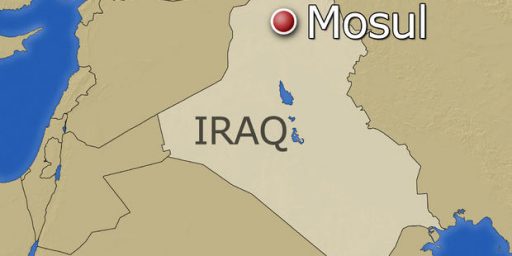Discussion Question: Insurgents vs. KKK
Craig Henry poses the following:
How are the “insurgents” in Iraq different from the KKK in Mississippi circa 1963? And aren’t the nameless election workers who are dying everyday in Mosul and Baghdad heroes like Chaney, Goodman, Schwerner?
Given that he has no comment section (he’s powering Blogger, after all), feel free to discuss below.





Back in 1963 Mississippi which major foreign power was the KKK battling against?
There is no difference. And the party of Robert Byrd supports both.
ken: From the KKK standpoint, the federal government, especially the courts, which were infringing on what many believed was state sovereignty. And, of course, the “insurgency” in Iraq is against the Alawi government and other Iraqis more so than against outside Coalition troops at this stage.
Just FYI; Blogger has an internal comment thingie.
I use an external one, myself; Haloscan.
Yep–just teasing him. 🙂
How are the “insurgents” in Irag different than the Patriots of
the American revolution? Idealogically speaking.
Back in 1963 Mississippi which major foreign power was the KKK battling against?
In their rebel-flag-waving minds, that would have been the United States of America.
How are insurgents in “Irag” different than the American Revolution?
Idealogically speaking, the Americans patriots fought oppression by the their occupiers, the British. They chose to self-govern, and secure liberty for citizens.
In “Irag” the coalition freed the people of Iraq from their oppressor, Saddam. They have been given liberty and the opportunity to self-govern. This would never have been possible under the dictator. When they get their shit together, they can ask us to leave.
You really should have paid attention in history class.
James, are you confusing 1863 with 1963?
By 1963 the issue of state sovereignty had been long settled and so the Federal government could not be legitimately thought of as a foreign power. Now if there were British or French Mexican in Mississippi to enforce civil rights for American blacks then you might have a point.
And the US federal government (and its courts) that you say the KKK was battling is nothing like the puppet government the Bush administration installed in Iraq that the insurgency is fighting. One has legitimacy and a written constitution, and the other one doesn’t have anything except the power of the the US military to back it up. I don’t see how you can be so confused.
Back in 1963 Mississippi which major foreign power was the KKK battling against?
Posted by: ken
As James said, the government of the United States of America, based in Washington, DC.
Many Southerners still regarded themselves at the time as as citizens of a defeated nation, the Confederate States of America–that’s why they called the Civil War “The War of Northern Aggression”.
And in the 1960’s under such a scenario, the KKK had actually more legitimacy as a governing force than the Iraqi “insurgents” do because they actually elected local leaders who believed as they did–Ross Barnett, etc. So the analogy being drawn falls down at that point.
People need to stop regarding the Klan as having been just a bunch of misfits acting out their repressed emotions at convenient targets–they were as much a mainstream political organization at the time as Tammany Hall was in NYC–just as corrupt, crooked, and evil, but no less mainstream.
But back to the similarities:
Did the KKK’S influence wane as their attacks got more and more violent? Yes.
Did they finally submit to overwhelming government intervention to enforce the laws passed by the national government? Yes.
Were they brought to trial and made to pay for what they had done? Largely, yes–and are still being made to answer now after 40 years.
Most importantly, how much longer did we see such events continue after the major battles were fought and the court victories/new election rules were brought in? Not very–and those that did were sporadic and isolated–overshadowed by riots in Northern cities with large African-American populations.
All of which speaks to American resolve in not letting those who resort to terrorist violence win any victories, moral or otherwise. Hopefully we will continue have the same resolve now in Iraq.
BTW, there were an awful lot of Americans who didn’t support the government’s use of force in the South to enforce civil rights laws and either thought more diplomcy in dealing with the elected officials was needed–or thought that the US govt. should just let them all rot. Sound familiar?